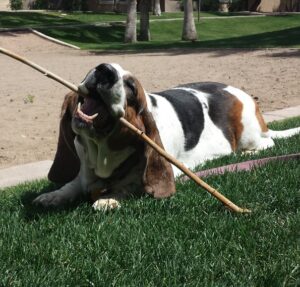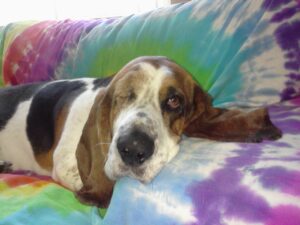When Rosie lost her right eye to glaucoma and became a pirate pup in 2015, our doctor said it would only be a matter of time until the illness took her other eye. They said most glaucoma dogs lose their second eye within a year of the first one.
Rosie made it 3 years and 9 months.
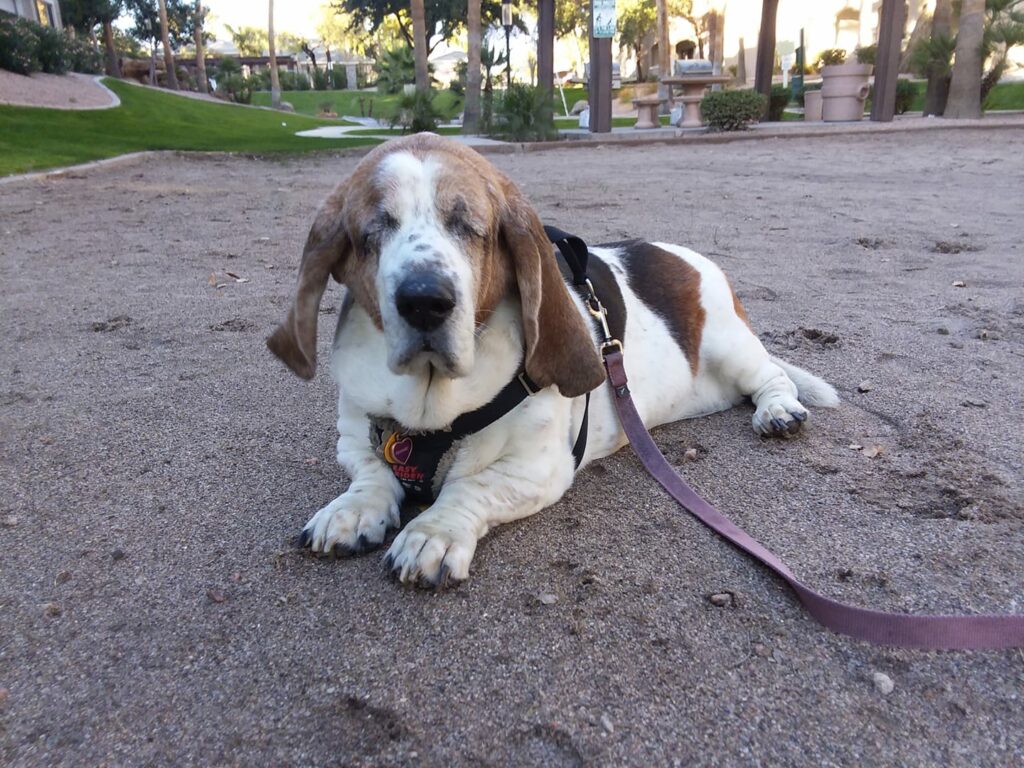
This post contains affiliate links. If you follow the link and make a purchase, you pay the same as everyone else, but I get a small commission. Any link marked with an asterisk (*) is an affiliate link.
Day 1: Sudden Blindness
Monday, November 19, 2018 (the Monday before Thanksgiving): Rosie woke up blind. When we went for our morning walk, she stumbled when the surface of the ground changed from sidewalk, to gravel, to grass. That’s what tipped me off that she wasn’t just tired. Not that she could see much before then – between the glaucoma and her eye drops, Rosie’s view of the world was like looking through a straw after her first eye surgery.
I called our puppy ophthalmologist’s emergency number (it was before 6 a.m.). The doctor gave the go-ahead to give Rosie’s emergency meds and told me to make an appointment with our regular vet. I mixed glycerin with milk and slowly poured down Rosie’s throat with a big syringe. This dehydrated her and hopefully brought down the pressure in her eye.
How About Today?
I got an appointment with our vet just before noon where they confirmed what I already suspected: Rosie was blind. Her glaucoma had spread and the pressure in her right eye was too high. It needed to be removed.
I asked our vet if they had availability on the schedule to do Rosie’s surgery the next day. She went to the back to check the surgeon’s schedule. When the vet returned, she said, “How about today?”
At 12:30 that afternoon, I left Rosie in the trusted care of our vet where the same surgeon who did her first enucleation would be performing her second one. The hardest part was not being able to explain to Rosie what was about to happen. I couldn’t tell her, “These nice people are going to put you to sleep, and when you wake up, your head isn’t going to hurt anymore, but you’ll never see again.”
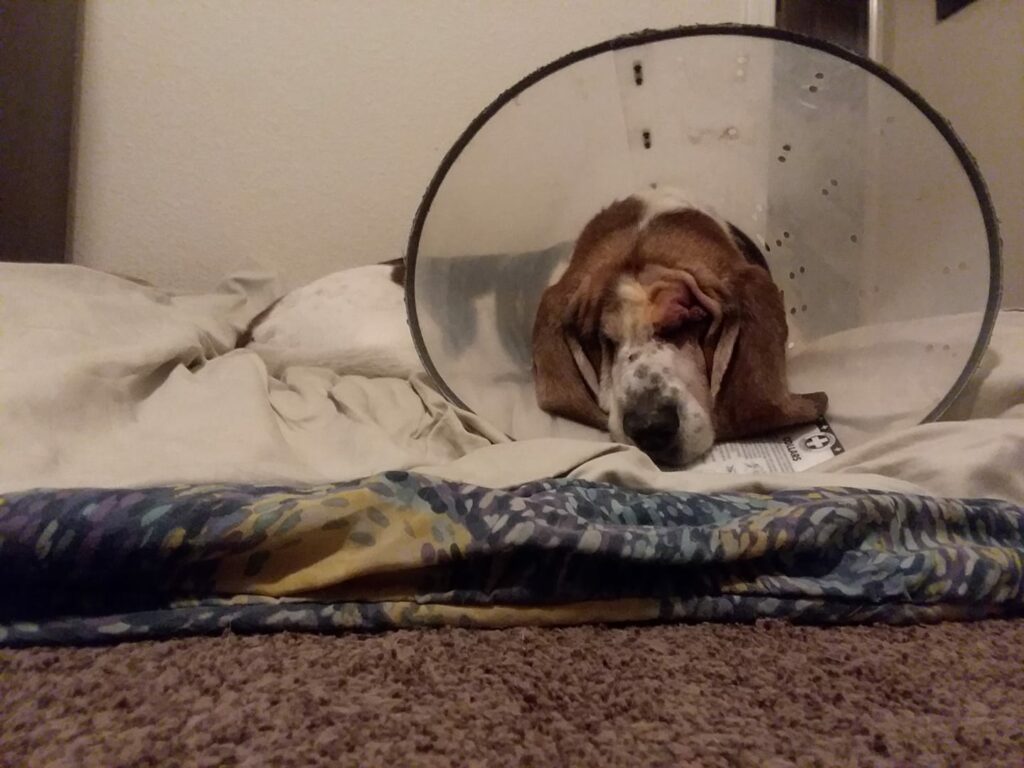
Support from the Blind Basset Community
One of the first people I reached out to after leaving Rosie was Daisy the Blind Snowflake – an all-white blind basset I knew from Instagram. Her mom told me that adapting to blindness is harder on the human than the dog and gave me some tips. That was reassuring.
Sarah and Thomas to the Rescue
I picked up Rosie from the vet at 8 that night. The vet tech was very sweet. She told me while Rosie was in recovery, it was just her and another dog in that area, neither one in a kennel or cages. At one point, Rosie randomly walked over to the other dog and gently bumped her head into them.
I snapped Rosie’s protective cone from her first surgery around her head, loaded her into the car, and drove her home. Newly blind and still groggy from surgery, she didn’t want to move much. When I unloaded her from the car, she refused to walk, even with a gentle tug on the leash.
I had a moment of mild panic. What was I going to do? I can lift my 68-pound dog, but I can’t carry her the 100ish feet from my parking spot to our condo. I immediately called my neighbors, Sarah and Thomas, who bolted over to help. Thomas scooped up my potato sack of a dog and carried her all the way to her bed.
It turned out, Rosie was freaked out by the cone. As soon as I unsnapped it, she was fine. I made her a deal that she could have breaks from it while I home, nearby, and awake, if she didn’t scratch at her stitches.
Day 2: Surreal
The day after surgery was surreal for me as I looked at my beautiful dog with her swollen purple eye and thought, “My dog is really blind. This isn’t going to change.”
She can’t see shapes. She can’t even see light. She literally has no eyeballs. Her world is dark.
There were some sad moments for me that day, but I found comfort in reminding myself that adapting is harder for me than Rosie. As I was experiencing these thoughts, she was comfortably relaxing on the lawn.

Day 5: You’re Killing Mommy
I often participate in Buy Nothing Day on Black Friday, but I had to make an exception. I was working in my home office, and Rosie was crashing around the living room in her cone.
Bang bang bang bang bang!
I try to be patient with Rosie, especially in times like this where she can’t help it, but the noise was making me insane. I think at one point I actually said, “Rosie, you’re killing Mommy.”
A quick run to Ryan’s Pet Supplies saved my sanity. I got Rosie a soft inflatable doughnut to replace her plastic cone. I think we were both happier for it.
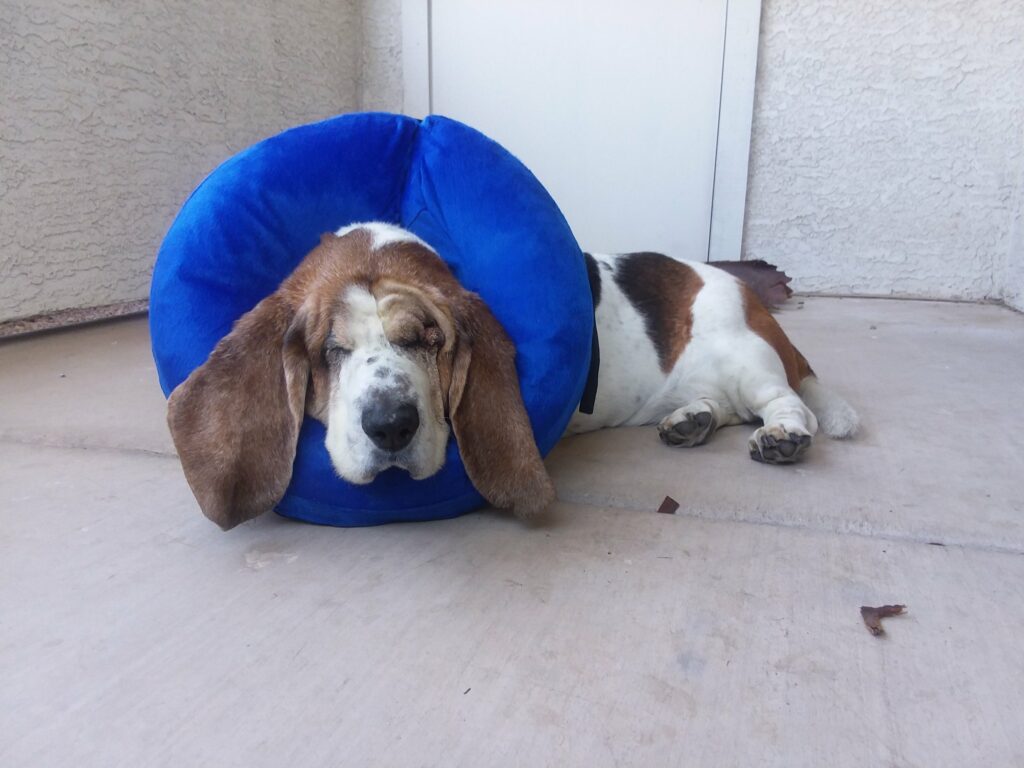
Imperfect Navigation
Basset hounds are scent hounds. I figured navigating as a blind dog would be easy for Rosie. I was surprised to see her that she couldn’t beeline toward a scent.
For example, Rosie’s bowls are in the kitchen. You have to go around the counter to get to them. When she walks to meals, I have to watch to make sure she doesn’t walk into a chair that’s under the dining table. There’s plenty of navigation space. Sometimes she sniffs at her water bowl before realizing that her food bowl is next to it. Even though she has a top-notch sniffer, she’s still navigating in the dark.
Going for walks is a daily adventure for us. We switched to walking with her car harness after her second surgery – a suggestion from the vet tech. At first, it was like walking a marionette. I always have to be on the lookout to make sure she doesn’t inadvertently walk off a curb. When I let Rosie lead, she frequently walks in ovals in the parking lot. I’m not sure why she does that.
I learned that other owners taught their glaucoma dogs verbal commands for “right,” “left,” “slow down,” and “hard stop” while they still had some vision. Yeah . . . Rosie and I didn’t do that. She spent the last 4 years mostly being self-directed on our walks and often walked off-leash. Going back to wearing a leash has been quite the adjustment for her.
One thing I do during our walks is I let her bump into things. Not hard. When we’re approaching a car or a wall, if she wants to keep walking toward the solid object, I’ll slow her down and let her gently bump it. I figure she’s not going to learn how close things are without experiencing it.
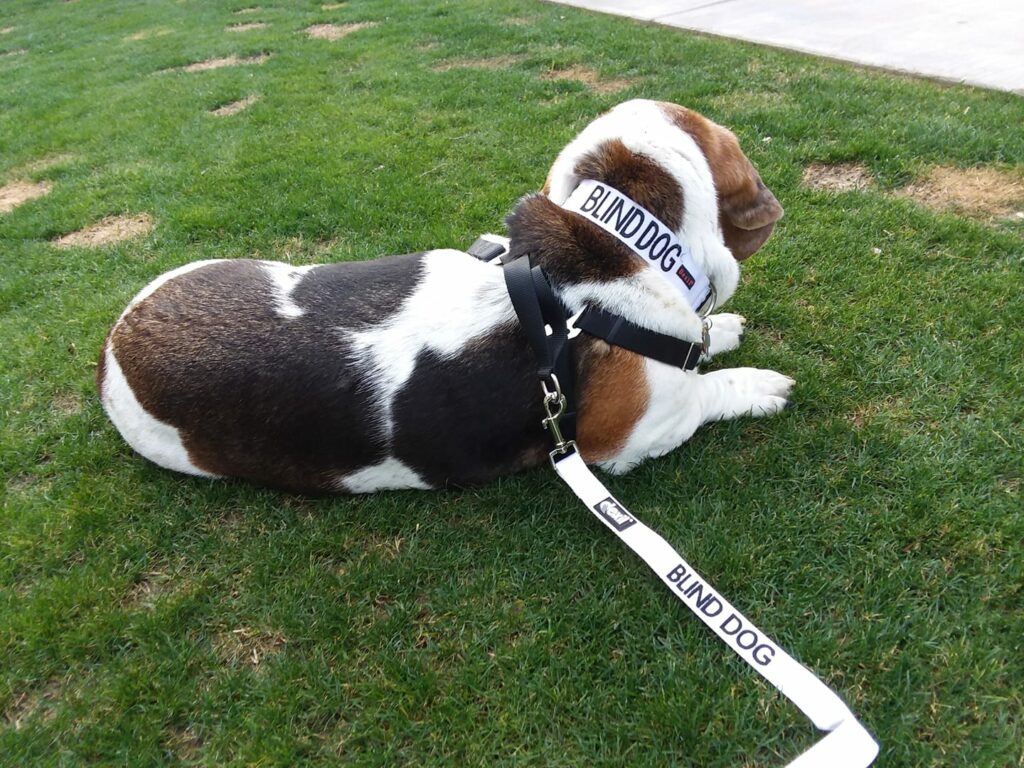
Rules for Blind Dog Living
Here are some of the rules I’ve learned for living with a blind dog:
- Don’t move the furniture. (I’m not one of them, but apparently there are people who recreationally rearrange their furniture.)
- No clutter on the floor. Don’t leave things like shoes out where your dog can trip on them.
- Open doors slowly. You never know where your blind dog is on the other side. Your dog cannot tell how fast the door is moving and get out of the way.
- You can help your dog navigate by tapping on the floor or wall near where you want them to go.
- Protect your blind dog from approaching dogs. During our first week of blind living, a rambunctious dog came up too fast on Rosie. (He just wanted to play.) That was the moment I learned to step in front of Rosie to physically block her from fast approaching dogs.
- Use a harness to walk your blind dog. You don’t want to pull at their neck.
- Use a “blind dog” leash.* Rosie has the leash and collar.* This way, anyone approaching us will see that she’s blind and be more thoughtful.
- Use scent-based play. We like to play hide-the-treat where I’ll hide pieces of dog treats in shoes, in her bed, behind doors, etc., where she has to sniff them out. Rosie also loves pushing around her Kong treat ball.*
- Give all other treats directly to the dog’s mouth. For dental sticks,* bully slices,* and Milkbones,* I hold one side of the treat near her face, and let her grab it with her mouth.
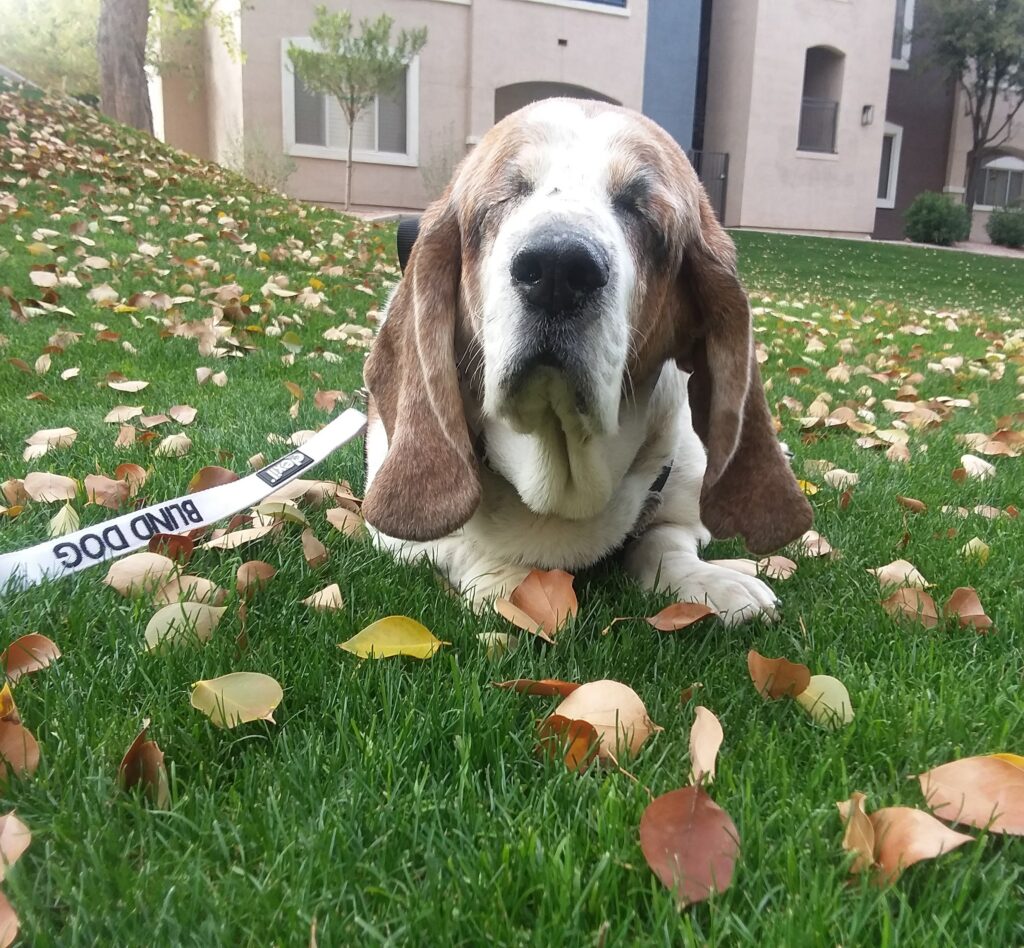
Day 90: Getting the Hang of It
I’m still getting used to having a blind dog. I’ve seen a big improvement in how well she navigates our condo and our complex. She’s gained a lot more confidence in the last few weeks.
She often sticks close to walls and furniture both when walking and laying down. Whenever she lays down at home or in the office, her butt or side is usually touching something. I think this gives her a sense of security about where she is. Whenever I’m looking for her, I scan the edges of the room.
One of the things that gives me the warm fuzzies is seeing her recognize familiar people and dogs. Her tail wags like crazy when she realizes she’s found a friend, sometimes followed by happy whines.
Over the last 90 days, Rosie and my lives have changed a lot. She doesn’t need eye drops anymore. We walk slower. I have to get out of her way, because she’s not getting out of mine. I try to be careful about scary noises like the food processor and vacuum.
On the flip side, a lot of things have stayed the same. Rosie is still my baby. She’s still as stubborn as ever, and probably now even more spoiled (as she should be).
